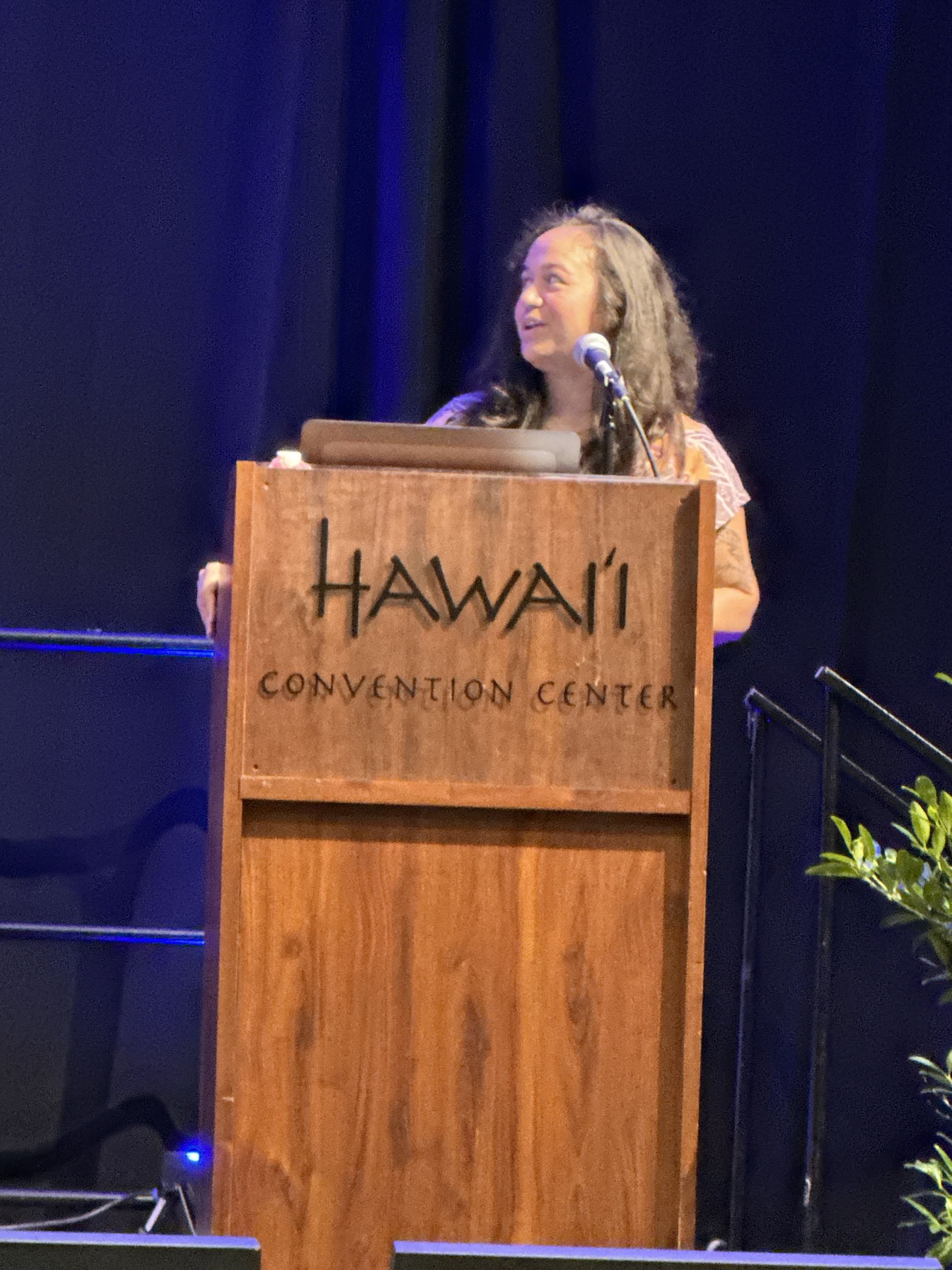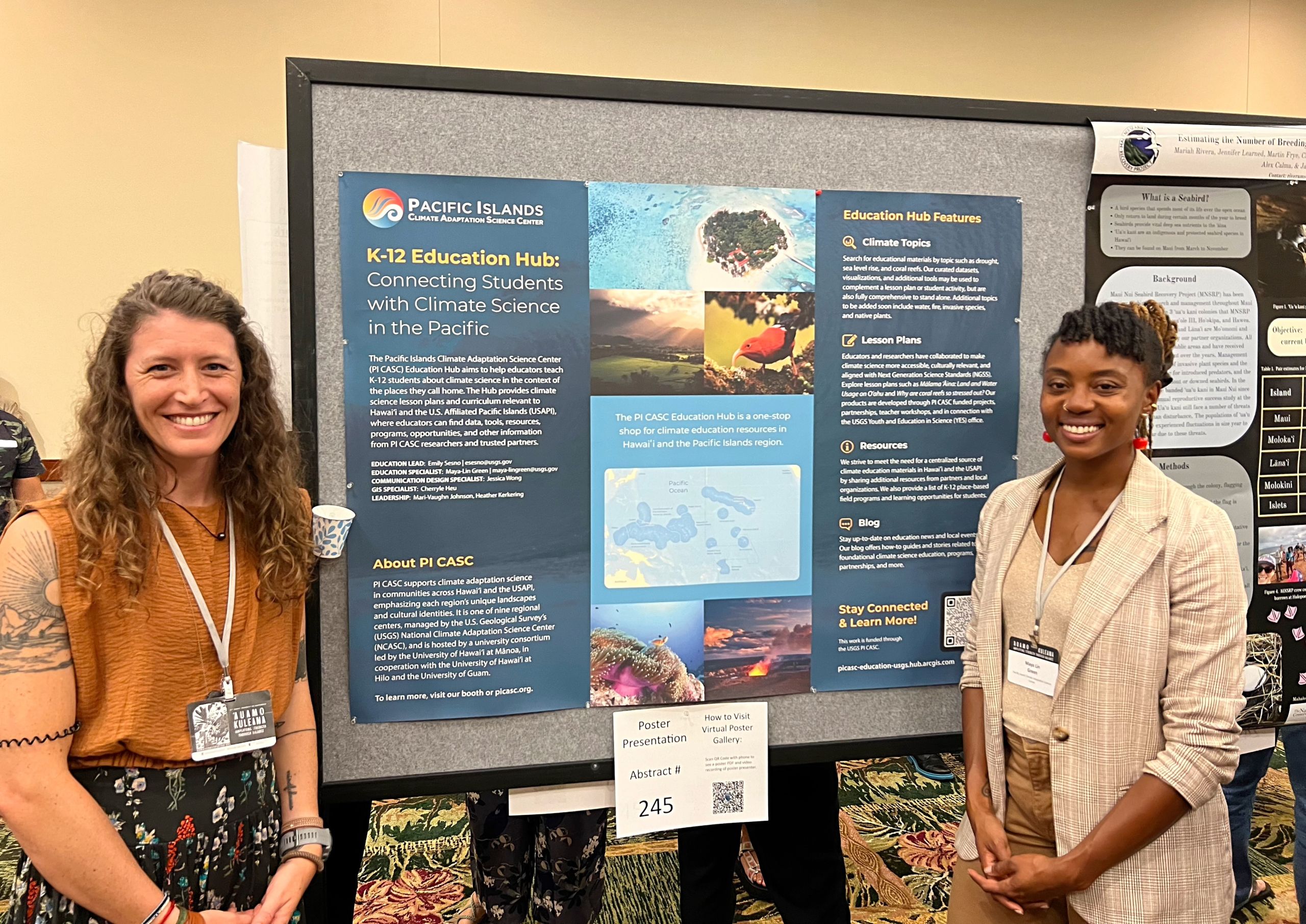PI-CASC Scientists Showcase Climate Adaptation Research at HCC
September 1, 2024

Researchers from the Pacific Islands Climate Adaptation Science Center (PI-CASC) led workshops and presented on the center’s crucial work in climate adaptation science at the Hawaiʻi Conservation Conference (HCC), held from July 30 to August 1, 2024 at the Hawaiʻi Convention Center in Honolulu. The theme for this year’s conference was “ʻAuamo Kuleana – Amplifying Strength Through Balance.”
The annual conference brought together a diverse group of scientists, policymakers, conservation practitioners, educators, students, and community members from Hawaiʻi and the Pacific. It served as a vital platform for knowledge sharing, connection, and inspiring action towards unified climate resilience and resource management goals.

“PI-CASC is thrilled that so many community members, researchers, and students we support contributed their knowledge and experience to the HCC network. Our future priorities and adaptation projects are shaped by these interactions,” said Heather Kerkering, PI-CASC Assistant Regional Administrator. “HCC is such a wonderful event that allows us to grow our network, share our science, and be part of building climate resilience by amplifying strength through balance.”
PI-CASC’s presence at the conference was substantial, with several supported principal investigators presenting their work across various sessions. On July 30, Rebecca Ostertag (UH Hilo), Susan Cordell and Christian Giardina (U.S. Department of Agriculture), Thomas Giambelluca (UH Mānoa), and Ryan Longman (Pacific Drought Knowledge Exchange, PDKE) joined others to discuss how long-term forest monitoring data from the Hawaiʻi Permanent Plot Network can inform management. Melissa Price (UH Mānoa) compared the effectiveness of conservation actions for endangered species on the islands of Maui Nui, while Jonathan Price (UH Hilo) evaluated ecosystem-level considerations for Maui Nui’s Landscape Conservation Plan.
PI-CASC researchers led forums and workshops the following day, focusing on critical topics like community co-production and restoration. Katy Hintzen (UH Mānoa) co-organized a forum supporting Indigenous-led climate adaptation research in Hawaiʻi and Alaska, in partnership with scientists from the Alaska Climate Adaptation Science Center.. Patrick Hart (UH Hilo) organized a symposium and gave a presentation on new tools for the automated recognition of Hawaiian bird species. Yoshimi Rii Claborn (UH Mānoa) discussed the impact of sea-level rise on fish communities. Emily Sesno and Maya-Lin Green from PI-CASC’s education team presented at an evening poster reception to discuss PI-CASC’s ongoing contributions to the K-12 education space.

On the conference’s final day, Elliott Parsons (UH Mānoa) organized a forum on climate-related disasters in the Pacific, focusing on lessons learned to increase resilience in Hawaiʻi through better working relationships between emergency responders and resource managers. Patrick Hart organized an additional workshop introducing a new oli (chant) for the health of Hawaiian birds, produced in partnership with Kumu Kekuhi Kealiʻikanakaʻoleohaililani, an educator with four decades of training in Hawaiian chant and hula.
Parsons, who serves as the specialist for the Pacific Regional Invasive Species and Climate Change Network (RISCC), commented on the impact of presenting and attending HCC:
“One of the many things that Pacific RISCC does really well is bring people together, and HCC is such a great venue for collaboration. We had participants in our session from Hawaiʻi but also from the U.S. Territories in the Pacific, which greatly expanded the knowledge and expertise we could draw upon. Having the ability to be in a small group setting and talk to others about challenges and solutions – I can’t stress how valuable that is.”
HCC facilitates the exchange of ideas and fosters collaboration among diverse organizations and interested community members. For PI-CASC, participation in such events is essential not only to sharing relevant research findings but also to building knowledge exchange networks and having the critical conversations necessary to push ideas forward – translating scientific knowledge into practical strategies.
As climate changes continue to pose significant threats to the unique ecosystems and communities of Hawaiʻi and the Pacific Islands, the role of organizations like PI-CASC, Pacific-RISCC, and the Hawaiʻi Conservation Alliance convening at events like HCC becomes increasingly vital.


